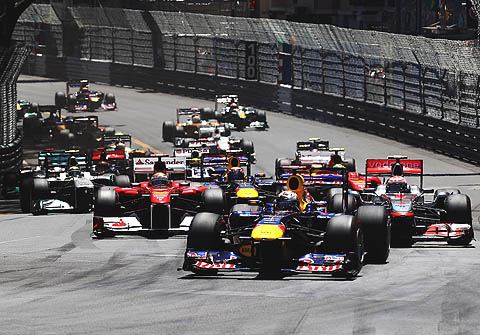


09/06/2011
NEWS STORY
 |
Given how exciting the racing was last year you would be forgiven for thinking that the sport was on a roll. However, according to new research produced by F1's industry monitor Formula Money, in 2010 the sport was still suffering from the exodus of car manufacturers the previous year. It is a wound which may take some time to fully recover.
Writing in the Mail, Pitpass' business editor Chris Sylt, reveals that F1's total revenues fell 6.2% to £2.67bn ($4.4bn) last year despite two races in Canada and South Korea being added to the calendar and three new teams joining the sport.
The drop was driven by the departure in 2009 of BMW and Toyota which had a combined annual F1 budget of around £454m ($746m). The two manufacturers directly contributed £258m ($425m) of this and they are believed to have invested a total of £1.46bn ($2.4bn) in their F1 campaigns over the five years before their exit.
Spending by F1's team owners plummeted 45% to £372m ($611m) last year knocking it off the top spot as F1's biggest source of revenue. It was overtaken by team sponsorship which only fell by £7.5m ($12.4m) to £461m ($758m).
The loss of these two manufacturers alone directly led to 16 sponsors leaving F1 including Panasonic which was paying Toyota £36.5m ($60m) every year. The impact of this was minimised by new sponsors signing up to the new teams which joined F1 last year - Lotus, Hispania and Virgin Racing.
Other more established F1 teams also gained sponsors with two of the biggest being British software firm Autonomy's £4.8m ($8m) deal with Mercedes and forex broker XTB's £3.04m) $5m partnership with McLaren. However, as the number of teams increased, average sponsorship income per outfit fell from £46.9m ($77.1m) to £38.5m ($63.2m).
Although sponsorship overall is back on the up, brands certainly aren't throwing their money around and are looking for safe bets. The last thing they want is for their on-car logo to get little exposure on television because the team is languishing at the back of the pack. This has further solidified the financial position of the best performing teams and widened the gap between the rich and the poor.
Remarkably last year, the top three teams in the standings together accounted for over half of the total amount of sponsorship received by all the teams. Even more surprisingly, Ferrari alone received 32.5% of the total spending by sponsors on F1 teams. Its £30.4m ($50m) deal with Spanish bank Santander fuelled the team's sponsorship income to (150m) $246.5m - the highest total for any outfit in the history of F1. The loss of Abu Dhabi-based sponsors Etihad and Mubadala has reduced Ferrari's sponsorship income by around 11% this year but it is still the highest of any team in F1.
After sponsorship and team owner spending, F1's third biggest source of revenue is not fees from television stations as might be expected. They are believed to have brought in £286m ($470m) last year whereas race hosting fees from circuits accounted for £346m ($568m). They bucked the downward trend and accelerated by £73.1m ($120m) due to the addition of the new races.
Clauses in the race promotion contracts escalate the amount charged by 10% annually and Formula Money's data shows that one of the biggest payers - Abu Dhabi - will be charged an estimated £53.4m ($87.7m) every year by 2016 when its current contract ends. If it signs a new contract it is likely to become the first circuit to pay over £60.9m ($100m) annually. Government grants of £249.7m ($410m) partly covered the race hosting fees last year with total ticket sales coming to around £284.4m ($467m).
The biggest sources of the remaining £670m ($1.1bn) of F1's revenue are trackside advertising and corporate hospitality. They were roughly stable at a total of £257m ($423m) last year as although the number of races increased, marketing and entertainment budgets were slashed.
The other notable source from the remaining revenue was that of F1's official partners. New deals with watch company Hublot and the UBS investment bank led to the total contributed by F1's official partners accelerating to £55.1m ($90.5m). This makes F1 itself better sponsored than every team except for Ferrari and McLaren. It is yet another reason for the love hate relationship between the teams and F1's boss Bernie Ecclestone.